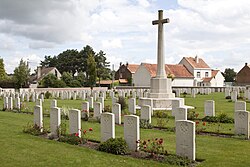See also: Death records

Cemetery records are the information and documents kept by a cemetery office. These records differ depending on the type of cemetery, location, and time period. Some cemeteries do not keep records, while others may no longer exist.
Cemetery records may also be referred to as sextant records. Information on these records may include:
- Name
- Date of death
- Cause of death
- Location of burial within the cemetery (section, plot number)
- Other names of people buried in the plot
These records may be found on index cards, ledgers, spreadsheets, or online databases.
Research your ancestors on MyHeritage
Types of cemeteriesTypes of cemeteries
Understanding the types of cemeteries can help understand what types of records may or may not exist. There are different types of cemeteries, and these cemeteries differ in what, if anything, they document. Types of cemeteries include but are not limited to:
Church or religious cemeteriesChurch or religious cemeteries
Records may include church and cemetery records. These cemeteries may exist adjacent to a church, but there are instances where a religious cemetery is found elsewhere.
Family cemeteriesFamily cemeteries
These cemeteries are on private land. Burials may be limited to family members or nearby friends and neighbors. Official records beyond a gravestone most likely do not exist.
Ethnic cemeteriesEthnic cemeteries
These cemeteries may be limited in who can be buried there. For example, a cemetery may be a burial place for the Chinese in a community. Formal record keeping may or may not exist.
Public cemeteriesPublic cemeteries
City or public cemeteries are burial places open to a community (or specific populations within a community). Records may exist, especially if it is still an active cemetery. These records can include everything from where the deceased is buried to birth and death date to next of kin. Check with a cemetery office, a directory found in the cemetery, a local archive, or a city government office to learn more about burials.
Private cemeteriesPrivate cemeteries
A private company may own a cemetery and will have records in its office.
Fraternal lodge cemeteriesFraternal lodge cemeteries
Fraternal lodge cemetery burials are reserved for members and their families. In some cases, those cemeteries may eventually be given to the local city for the burial needs of the community. Being buried in a fraternal lodge cemetery does not guarantee the deceased was a member of a fraternal order. Check the tombstone for any symbols or clues. Records may exist for burials. These records may be found in the city or the government entity the cemetery was deeded to or an archive.
Military cemeteriesMilitary cemeteries
These cemeteries are for the burials of soldiers or veterans and their families. They can include war dead found near where a battle was fought. Cemetery records should consist of not only the place of burial but some information about the person's military service. These records should be acquired along with military records. You may find information about a military burial online through the government's Veterans Association.
Mass burialsMass burials
(not necessarily in an established cemetery)
There may be a mass burial in some cases where there is a large disaster or epidemic. This can occur because of the need to bury the deceased quickly or because the family has not claimed the dead. Very few records may exist for these burials, and in some cases, some of the deceased may not be identified. Search area historical newspapers for clues.
Government cemeteriesGovernment cemeteries
Military cemeteries are one type of government cemetery, but there are also cemeteries found on the grounds of institutions such as state hospitals, asylums, Native American schools, and prisons. Some graves may not be identified by name. These may be considered private, meaning a lack of accessible records.
GravestonesGravestones
Some cemetery records are simply database websites with burial information and/or gravestone photographs. These websites may utilize volunteers who enter information and photos of gravestones. Others might be provided by a government agency or by the cemetery itself.
Volunteer informationVolunteer information
When using websites, databases, or transcriptions that rely on volunteer help to enter information and take photographs, keep in mind that these websites capture information from visible gravestones or burial markers. That means burial information can be missing due to illegible stones (weather, wear, pieces missing or in disrepair), missing stones, or the absence of a stone. Not all burial places are marked. In addition, volunteers choose how much to add to the database, which means that information may not include all burials. These websites do not include the records of a cemetery, and the volunteers may be entering information without the cemetery’s knowledge. Always contact the cemetery office, if available, to obtain additional information and records.
Cemetery websitesCemetery websites
Increasingly, active cemeteries are providing some information online. Typically, this is an index or database with the names of those interred there. This information may not include everything in the cemeteries' records and should be considered a finding aid to help families locate their deceased loved ones.
See alsoSee also
Explore more about cemetery recordsExplore more about cemetery records
- Death, Burial Cemetery, Obituaries record collection on MyHeritage
- Vital Records: How to Find Birth, Marriage & Death Records on MyHeritage Knowledge Base
- BillionGraves

